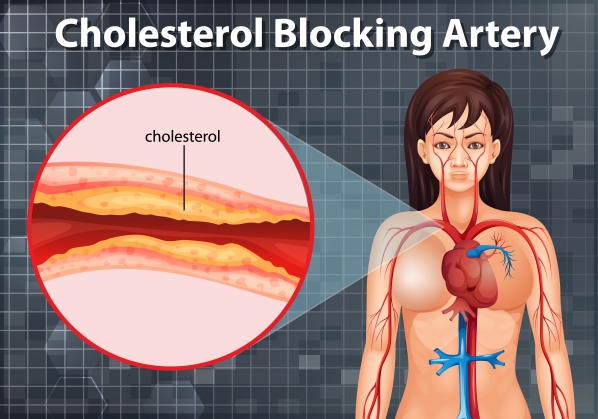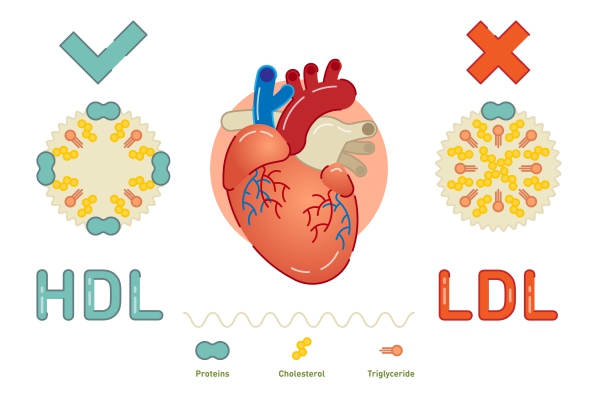Hyperlipidemia, High cholesterol, Fats, Lipids, Atherosclerosis
Description : Hyperlipidemia is a problem of an excessive amount of fats (lipids) in your blood, it can lead to a
Article Details :
What is Hyperlipidemia?
Hyperlipidemia, or most commonly known as “high cholesterol”, is the medical term used to describe a problem where there is an excessive amount of fats (lipids) in your blood. There are several disorders or causes that can result in this abnormally high amount, some of which can be controlled. The two types of fats that can be found in the circulating blood are triglycerides and cholesterol. They both come from consumption of fatty foods such as dairy products, red meat, or eggs. Even if it is most likely to be a lifelong condition, it is treatable. If left untreated, hyperlipidemia can lead to several complications such as heart diseases and other serious conditions. Once you are diagnosed with hyperlipidemia, you will be required to bring about lifestyle changes and you might also be needing medications in order to decrease the likelihood of ending up having complications.
Hyperlipidemia is a problem of an excessive amount of fats (lipids) in your blood, it can lead to a heart diseases and other serious conditions
Causes of Hyperlipidemia
Cholesterol comes from what you eat. The more you eat foods that are high in cholesterol, the higher the level in your blood. These are found in high amounts in:
- Egg yolk
- Pastries
- Milk and dairy products
- Processed meats
- Processed vegetable oils
- Butter
- Fried foods
- Ice cream
- Alcohol
- Red meat
Lack of exercise and increasing age also contributes to hyperlipidemia. Even if hyperlipidemia can be inherited to some degree (run in families), it is most commonly acquired due to an unhealthy lifestyle.
Some medical conditions can lead to high cholesterol levels such as liver diseases, diabetes, underactive thyroid, kidney disease, pregnancy and polycystic ovary syndrome amongst others.
Some medications can also lead to an increase in cholesterol in the blood such as diuretics, glucocorticoids, immunosuppressant and oral contraceptives.
Signs and symptoms of hyperlipidemia
Usually, if a person has hyperlipidemia, he/she would not know as it does not cause any symptoms. The person may have symptoms if the condition is advanced enough to cause complications. Cholesterol is a substance than can come together to form a plaque on a blood vessel wall, slowly clogging the artery as it becomes bigger. The narrowing of blood vessel can result in high blood pressure since blood can no longer pass through the blood vessel easily. Once the artery is completely blocked, the person ends up having heart disease or heart attack. Furthermore, blood can clot on the plaques. These clots can then break off and travel all the way to the heart or to the brain hence causing stroke.

Making a diagnosis
Since hyperlipidemia does not have any symptoms, only blood tests can confirm if you have it or not. This blood test is called a lipid profile. It is obtained by taking a sample of blood and sending it to the laboratory to check for the levels of cholesterol mainly:
- LDL (low-density lipoprotein) cholesterol which is the “bad” cholesterol causing formation of plaques in arteries
- HDL (high-density lipoprotein) cholesterol which is actually a “good” cholesterol that prevents the occurrence of heart disease
- Triglycerides which is another type of fat in which your body converts any excess calorie it does not need right away into
- Total cholesterol which is a sum of all of the above
Your doctor may ask you to fast (no eating or drinking; except for water) for about 8 to 12 hours prior to the test.
LDL cholesterol is what will actually build up in your arteries while HDL cholesterol is what will remove LDL cholesterol from the arteries and send it back to the liver. Hence, having too much LDL cholesterol and not enough HDL cholesterol is what causes hyperlipidemia.
The test is considered to be abnormally high if your total cholesterol levels exceeds 200 milligrams per decilitre. However, this varies from person to person and other factors should be taken into consideration to know if the result of the test is truly abnormal and what the next step is. These factors include the person’s age, current health problems, whether the patient is a smoker or whether the patient has a close family member who has heart problems. This will be best worked up by your doctor.
It is also recommended that adults aged more than 20 years old should have their cholesterol checked approximately every 4 years.
Treatment of hyperlipidemia
Treatment of hyperlipidemia starts with changes in your lifestyle whether it is inherited or acquired. Sometimes, change in lifestyle alone may not be enough to decrease the risk of developing complications such as heart attack or stroke. In some cases, your doctor may need to prescribe you some medications, however, in combination with lifestyle changes, this will result in better decrease in cholesterol.
Diet change
This is the first step in managing hyperlipidemia. The aim is to decrease LDL cholesterol and increase HDL cholesterol in your blood. An easy Read more



